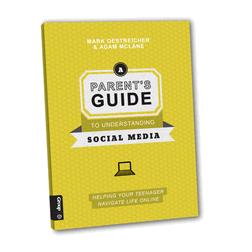 Mark Oestreicher & Adam McLane – A Parent’s Guide To Understanding Social Media
Mark Oestreicher & Adam McLane – A Parent’s Guide To Understanding Social Media
4.5 / 5
This book is part of a series of ‘Parent’s Guide’ books published by Simply Youth Ministry (see our review of A Parent’s Guide To Understanding Teenage Guys). It’s written by Marko and Adam who are the founders of The Youth Cartel and have been involved in youth ministry for decades.
Initial Reaction
Before reading it, I’d questioned the wisdom of this book being published in the first place. The social media scene is changing all the time, so I figured any book published on the subject now could easily be irrelevant within a year or two.
The good thing is, Adam and Marko were clearly aware of this – they even make reference to this very problem in the book. This book therefore isn’t a guide to specific types of social media like Facebook and Twitter, although they do cover these two sites more than others, giving various stats about them and how young people are currently using them.
How To Parent
Instead, this book gives overarching ideas and principles for parents to guide them in how they can approach the subject of their child’s social media usage. There’s no scaremongering involved – the authors don’t sensationalize anything or make it seem like every teenager is posting naked pictures of themselves online.
They’re also very realistic about the fact that even if parents ban social media accounts, young people can easily find a way around them. It’s therefore much better for parents to help guide their children in how they should conduct themselves online (and off), particularly due to consequences that they may not have considered.
In fact, they even suggest that it can be counter-productive to install things like internet blocking software, going so far as to describe it as lazy parenting! Instead, parents should be proactively involved in how their children are using the internet.
Even though it offers suggestions for people on how they should parent, it’s not done at all condescendingly. Besides, if a parent’s reading this guide, there’s a good chance that they’re wanting guidance on how to parent when it comes to social media.
Practical Tips
Despite being a fairly short book (all the books in this ‘Parent’s Guide’ series are of a similar length), it has numerous useful tips that parents can put in place in their household.
This includes suggestions like:
- Having computers in public areas in the house
- Having access to your child’s accounts
- Having all family members (i.e. parents too!) keep mobile devices in one central location overnight to charge
In my opinion, these are the types of extremely useful ideas that parents may not have thought of, so make the book worth getting for that reason alone.
Privacy
This guide also covers the all-important topic of online privacy and how young people’s actions now could come back to haunt them again in the future.
As mentioned earlier, this isn’t done in a scaremongering way, but is an important issue to address with youth as once something’s online, deleting it doesn’t mean that it’s gone.
Good For Both Christians & Non-Christians
Marko and Adam are both involved with youth ministry, so some small sections look at social media from a Christian perspective. However, it’s not at all preachy so I’d feel comfortable giving this book to parents who aren’t Christians.
All the underlying principles and ideas are valid whether or not you’re coming from a Christian perspective – we’ve therefore bought a copy for some friends of ours who have a teenage daughter.
Downsides?
Similar to the Teenage Guys book, the flow of the book isn’t always completely smooth due to the need of advising which of the authors is writing at a given point in time.
For example, you have sentences that read:
- When I (Adam) fell…
- When I (Marko) post…
- Over the years I (Adam) have…
Like I mentioned in the other review, I’d personally have preferred it to be laid out slightly differently:
- AM: When I fell…
- MO: When I post…
- AM: Over the years I have…
Again, this is my personal preference and doesn’t negate the great ideas and information that’s throughout the book.
I can therefore highly recommend this book for all parents of young people who are old enough to be using social media.
It’s also an excellent resource for youth workers. Even if you’re well versed in social media, the book will give you many ideas that you can pass on to parents. Better yet, get them a copy of this too!
Buy A Parent’s Guide To Understanding Social Media


 When you work with young people, it can be hard to come up with youth work ideas all the time. That’s why we provide free youth work ideas, resources, session plans, games, recommended reading and more – 6 days a week.
When you work with young people, it can be hard to come up with youth work ideas all the time. That’s why we provide free youth work ideas, resources, session plans, games, recommended reading and more – 6 days a week.